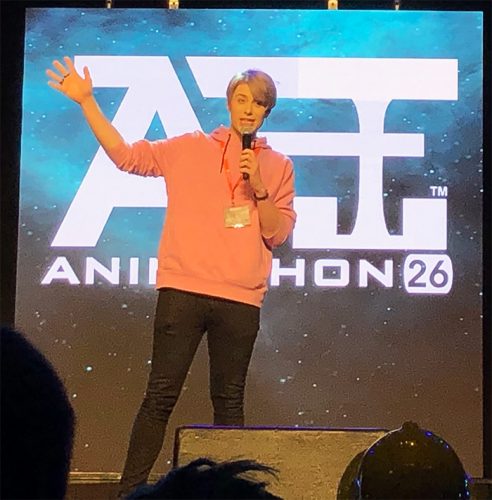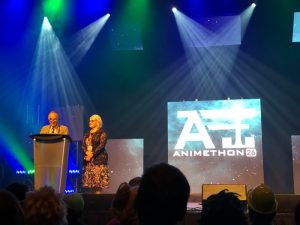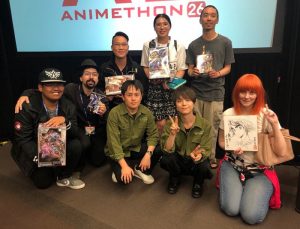
Animethon 26 was proud to host some popular and well-loved voice actors this year, one of whom is Daman Mills. He’s an American voice actor who’s best known for voicing Monaka and Frieza (as an understudy for Christopher Ayres) in Dragon Ball Super, Jyugo in NANBAKA, and Ginshi Shirazu in Tokyo Ghoul:re. On Friday, the first day of the con, he hosted a panel centered on voice acting. Daman even brought some scripts and had members of the audience to come up to the front and give voice acting a shot while he gave them helpful advice and critiques. However, he was more than happy to do some Q&A throughout the entire hour-and-a-half panel.
When you were applying for an agent, what were you looking for that you decided would be a good partner to work with?
For me, I went to an agent and applied and everything...For when you’re applying to an agency, you need to have a commercial demo reel, not just a character demo reel because commercials are where the most money can be made in voice-over. I do a lot of anime, I don’t just do one thing.
Because, if you’re going to do this as a profession you need to be able to do commercials, promos, telephone prompts, audiobooks, so having that reel will allow clients to listen to your voice and be able to figure out where to place you or have you read on with that. Agents will not bring you on if you don’t have one. Having a character reel is important too, especially if you want to do video games, anime, anything like that. So for me, I picked one that had that department, had the needs for my market in Dallas, and where they would send the auditions that would also come in from Los Angeles.
I’m currently insulating my room for soundproofing, are there any specific things to look for with sound foam paneling?
Are there any big differences between reading for a video game as opposed to reading for an anime?
Cold reading meaning you are not rehearsing ahead of time, you are doing the line on the spot in the booth right there, right now. You don’t typically have time to watch the anime episode ahead of time. You have to rely on your director to fill you in on everything going on in that project. Then we will preview the scene with the Japanese on to get a taste of what’s happening in the scene and you’ll see the timing for mouth flaps. We have to match that as best as possible. When we come in for it it’ll be a three-beep thing, beep beep beep and you go. If you mess up, that’s fine, it happens, I mess up all the time.
It depends on the director, sometimes he’ll just do one or two lines, sometimes a whole page, it just depends on where you’re at as an actor and their preference and style. Honestly, studio too, because Funimation will do it that way, but Sentai Filmworks is a little different. When I was doing it they had no beeps, they wanted you to what we call, “chase it,” the entire time as much as you could get. So we wouldn’t preview it all, we would not have beeps, just wild go through it and follow along with the Japanese. It was a little different. It’s faster I suppose, but I personally like the other method better because it’s more efficient and contained. It can get overwhelming, especially if you don’t have as much insight on the stuff and you’re trying to cold read all of it at once without flubbing while trying to get the right delivery with it can be challenging.
Have there ever been times where you have to cut a line short because the mouth flaps just don’t work out?
Before I talk about video game dubbing, you know anime reactions stuff like ugh, ungh. It’s a weird exhale, inhale. There’s indicators on the script that say what kind of specific reaction it is. It’ll be an OM, open mouth, CM, closed mouth, CT, clenched teeth, or MNS, mouth not shown, which is always the best. Especially when things are underlined, meaning when we don’t have to match the flap, or there’s a mask or something, it makes it go so much faster. So those will indicate if you’re doing “OM attack”, “CT jump”, or “mouth not shown pain”, any kind of thing like that. I actually have a funny story. I also do script prep, and I have to make those reactions sometimes. I had done one for a relatively raunchy show. It was like an, “OM Sparkly Climax”. How else do I name this reaction? That’s what it’s going to be, and I left it. They thought it was funny.
Those are scribbled throughout the script, especially if you’re doing a fight reaction scene like in Dragonball or anything like that it’ll be placed in the script where you have a succession of those in a row. Trying to follow very specific reactions sometimes can get kind of hard. I try to just watch the picture and react to it, and if anything needs to change we’ll fix it afterward.
Video game recording is kind of a different beast because there’s a few different ways we can do it. For things that originate in a certain language, say Borderlands 3 where it’s all done in English first it is basically prelay, like how it is in western animation. Prelay meaning we will lay down the audio first and then the developers will animate to your performance rather than you trying to match anything. So you have a little bit more creative freedom with it rather than dubbing because you’re contained to the mouth flaps or translation, or the show itself. I did RWBY, and for that one, we had the script, I would record my lines, they would give me direction, and that was it. I didn't have to match anything. They took what I had and animated it. Games can be the same way.
Usually, you’ll do an A/B take. You’ll do one take, and then you’ll do something different to either clean it up or change it in a way. You’ll do one, and you’ll either move on or be given direction. The director will guide you through everything. If you’re like “I don’t know what’s happening”, they will be your guidebook essentially. Those can get a little more intense too with reactions because, say for a fighting game or anything that requires a lot of effort, you have to give an option for every sound you can make. What does it sound like when you’re gasping out of water, what does it sound like when you’re jumping down from this cliff, what does it sound like when you’re reaching over for this thing? Everything you can possibly do if they’re going to incorporate that kind of that.
You’re also recording in a vacuum. Often times for video games you don’t have the picture of the character present. If you do, you’re lucky. You don’t have the animation typically. You’re just kind of recording by yourself. Also, going back to anime, we record by ourselves. We don’t record in a group session unless it’s for what we call “walla”, which is when we’re building background ambiance for the city, a classroom, chatter you hear in the background.
For video games, yeah you’re just recording by yourself. There’s also mo-cap video game work where you are basically doing film/stage acting. I have not done any of this so I don’t really know much about it. It’s when they’ll put those dots all over your face or you’ll wear the headgear and you will literally be doing the performance. That’s becoming more commonplace for some stuff in LA, but I’ve never had any experience with that. For dubbing for video games, for Dragonball Fighterz that I did, we are still recording a vacuum. We still don’t have picture typically. Sometimes they give us a little reference video of what’s happening but we’re not matching to it because it’s usually not finished liked animation. So we will have the Japanese audio from the game and what we’ll need to do is they’ll play it and immediately after, chase it with your take. So you’ll hear it, listen to it for the tonality and the length of it, the pauses you need to take, and then you will give your performance. If it needs to go faster, or if they need to do any sort of fixing, it’ll be the same way with dubbing so you’ll need to be able to adapt to that.
Do you do any vocal exercises and if so, what do you do?
Also, if you’re doing a lot of screaming stuff you can hurt yourself if you’re not using your full diaphragm. If you’re screaming from your throat and not from down here you can potentially really damage your vocal cords to where you might hemorrhage or might get vocal nodes or polyps and things that require surgery. It’s scary, I went to a voice-over conference in March and there was a doctor from Los Angeles, she taught us a lot and had slides of some really gross stuff. There’s things of trying to relieve tension in your throat. There’s a trick with coffee straws and trying to do siren lip trill things through the straws to loosen up the muscles in your throat. Or to blow bubbles, literally blow bubbles in water to relieve that tension. Trying to massage your larynx back and forth.
Relieving tension in your throat muscles will ultimately help relieve strain on your chords. If you’re beating your chords together over and over it can cause calluses and polyps that can damage and ruin your voice. I get a lot of tea, I try to avoid dairy. It’s hard sometimes, but especially not during a session. Having a lot of water, and I have a throat coat medicinal tea I buy. There’s a great loquat Chinese syrup that I buy. You can find it on Amazon. It’s called Nin Jiom Pei Pa Koa. You get a spoonful and just eat it, or put in your tea and mix it in. Especially with all the screaming stuff you do in anime and video games if you’re destroying yourself it’s not good.
How important is the director’s role is in making an entire project decent?
Which anime has been the most difficult to dub?
Between anime and video games, what is the easiest for you to perform?
I’m not union, but I’m SAG eligible meaning I could join the union and do union jobs. If you join the union you can get medical benefits and higher paying, more well known jobs. You could get cast in a Disney project or something like that.
Most auditions that I get are sent to my email and I have to do them at home. Record it, edit it, get my takes together, and submit it. I actually have to do that while I’m here, in my hotel room under a blanket probably. If anyone hears me screaming from afar, I’m probably working. I wonder how many neighbors I have scared the crap out of.
Final Thoughts
Daman Mills is a super fun and quirky voice actor who is really passionate about his work. Hearing his advice really helped to inspire many aspiring voice actors and actresses. Seeing the guests come up to the front and actually trying to read the scripts aloud while getting some direction and feedback from Daman was incredible to see and be a part of. What better way is there to try out voice acting? We hoped that his panel inspired some of you as well to get into the profession! How many of you are thinking about trying out voice acting or have already started? Was there any information you found particularly helpful? Let us know in the comments below!
Recommended Post



